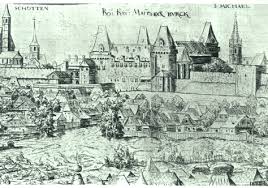He had hard work getting through the straw and twisted ropes; but get through them he did, and found the door of the stove. He slipped through, as he had often done at home for fun, and curled himself up there. Air came in through the brass fret-work of the stove. With great care he leaned out, drew the hay and straw together, and replaced the ropes. Then he curled himself up again, and, being safe inside dear Hirschvogel and very cold, he fell asleep.
他费了好大的劲才穿过稻草和扭曲的绳子;但是,他还是穿了过去,找到了炉门。他溜了进去,蜷缩在那里,就像他经常在家里玩的那样。空气从炉子上的黄铜微孔里进来。他小心翼翼地探出身子,把干草和稻草拉在一起,把绳子放回原处。然后,他又把自己蜷缩起来,安全地躺在亲爱的赫斯渥格尔的身体里,感到很冷,就睡着了。
The slow train took the short winter’s day and the long winter’s night and half another day to go over the ground that the mail-trains cover in a forenoon. Happily for August, the thick wrappings of the stove protected him from the cold, else he must have died—frozen. He still had some of his loaf and a little of his sausage. But he began to suffer from thirst, and this frightened him more than anything else.
缓慢的火车花了一整个短暂的冬日和漫长的冬夜,又花了半天的时间,才在一个上午走过邮车经过的地方。对于奥古斯特来说幸运的是,厚厚的炉皮使他免受寒冷,否则他一定是冻死了。他还有一些面包和香肠。但是他开始感到口渴,这比什么都让他害怕。
At last the train stopped with a jar and a jerk, and he could hear men crying the name of some town. Then he felt himself carried on the shoulders of men, rolled along on a truck, and set down, where he knew not; only he knew he was thirsty—so thirsty!
火车终于停了下来,发出一声震耳的响声,他听到有人在喊某个城镇的名字。然后他觉得自己被人扛在肩上,滚上一辆卡车,在他不知道的地方坐了下来。没有人知道他渴了——那么渴!













